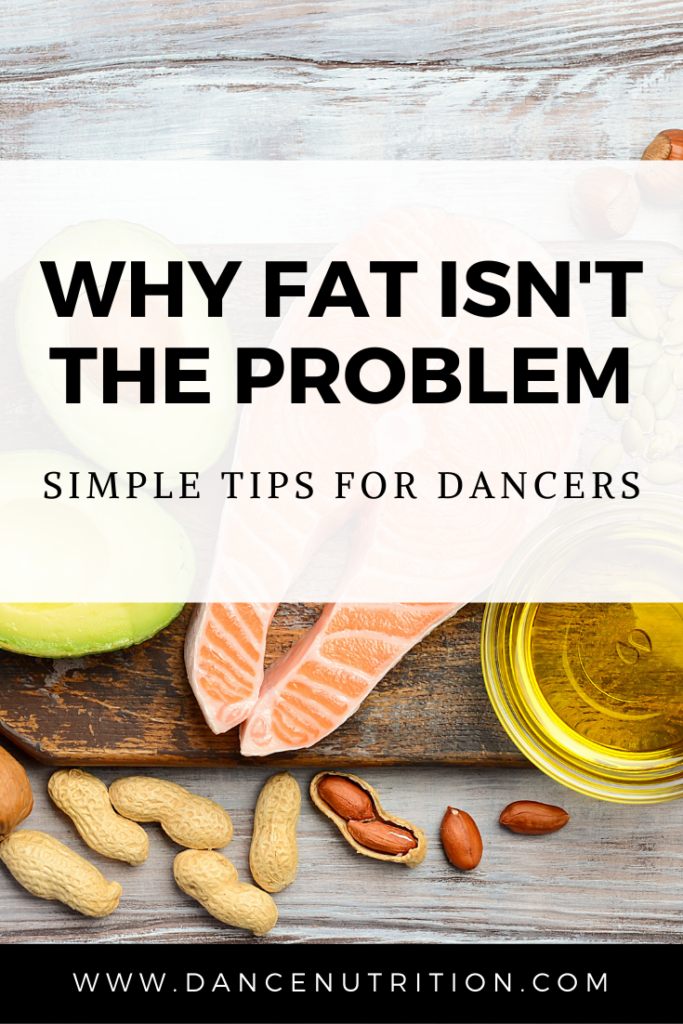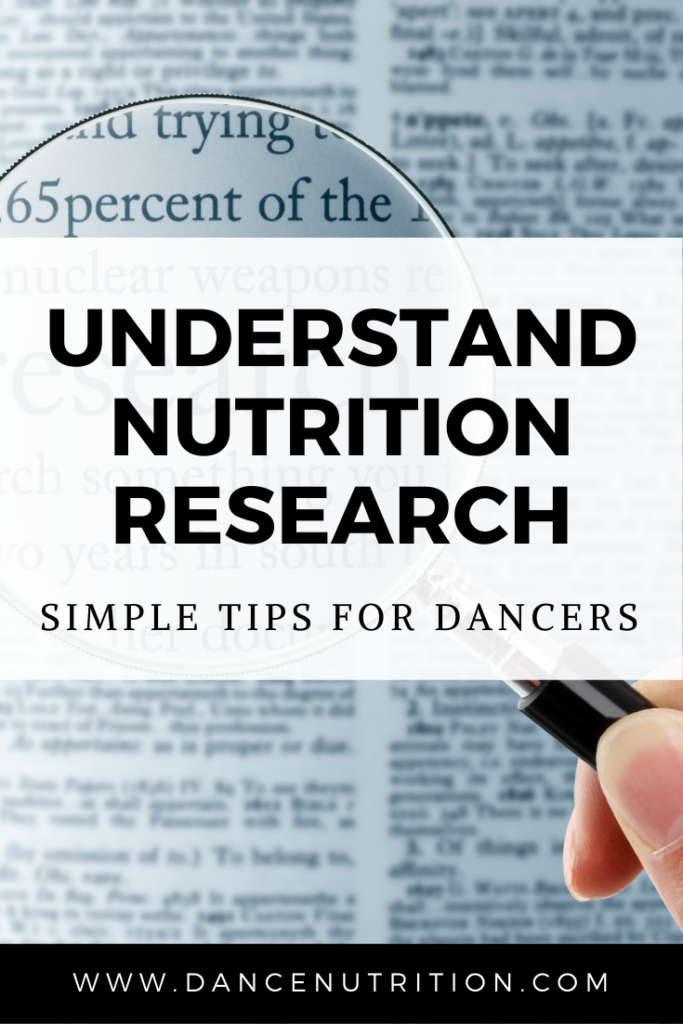For decades, dietary fat has been surrounded by confusion. General concerns date back nearly a century, when the American Heart Association suggested a possible link between fat intake and heart disease. At one point, we were told to avoid it at all costs; then came the rise of high-fat trends like keto. With so many mixed messages, it’s easy for dancers to feel stuck between extremes.
The truth? Fat is not the enemy. In fact, it’s an essential nutrient that supports your health, performance, and overall well-being. In this article, we’ll break down the role of fat in a dancer’s diet, clear up common myths, and highlight why balance— not restriction— is key. A quick reminder: if you’re in recovery from an eating disorder or struggle with disordered eating, I strongly recommend working with a licensed professional, like a Registered Dietitian Nutritionist, to explore these principles safely.
What the Research Really Says
Most nutrition studies are observational, which means they can show patterns but not direct cause-and-effect. While helpful, observational research is significantly limited. Systematic reviews and meta-analyses— studies that combine findings from a larger body of evidence across multiple research projects— are a more reliable way to understand trends.
But even these have their challenges, with most drawing mixed conclusions at best. In fact, a 2018 review on nutrition and cardiovascular health concluded that more intervention studies were needed, as the current findings were often contradictory and inconclusive.
What we do know is this: restricting macronutrients like fat can backfire. Dieting and weight cycling (losing and regaining weight repeatedly) are linked to negative health outcomes, including an increased risk of heart disease (here’s more evidence), reduced bone density, and mental health struggles. Instead of fearing fat, it’s more productive to look at how it supports the body.
Why Dancers Need Fat
Your body needs fat for countless reasons. Here are a few:
- Energy – Fat is a key fuel source, especially during moderate or longer bouts of activity.
- Protection & Insulation – It cushions vital organs and regulates body temperature.
- Vitamin Absorption – Vitamins A, D, E, and K rely on fat for absorption.
- Hormonal Health – Fat is necessary for hormone production and balance.
For athletes, including dancers, about 30% of daily energy intake should come from fat. Restricting it too much can increase risk for nutrient deficiencies— essential fatty acids and fat-soluble vitamins— leading to hormonal imbalances and Relative Energy Deficiency in Sport (RED-S).
That said, very high-fat, low-carb diets aren’t ideal either, especially for high-intensity movement like petit allegro. Carbohydrates remain essential for peak performance.
Sorting Through the Types of Fat
Not all fats are the same, but none need to be viewed as “bad.” Here’s a quick guide:
- Saturated Fat – Found in animal products (butter, full-fat dairy, meat) and some oils (coconut).
- Unsaturated Fat – Found in foods like avocados, olive oil, nuts, seeds, and fatty fish. These are linked to heart and brain benefits.
- Omega-3s – A type of unsaturated fat (ALA, DHA, and EPA) are anti-inflammatory and found in flaxseeds, chia, walnuts, and fatty fish. They’re essential for muscle recovery and joint health.
- Omega-6s – Present in oils like soybean and safflower. While not as anti-inflammatory as omega-3s, they are still beneficial compared to a diet high in saturated fat.
A Closer Look: Omega-3 Fats
Some feel that the Western diet contains too few omega-3 fatty acids and too many omega-6 fatty acids (particularly linolenic acid, which is found in soybean, safflower, and corn oils). Omega-3 and omega-6 fatty acids compete with each other for certain enzymes needed in their metabolism. The concern is that too many omega-6 fatty acids in the diet may interfere with the body’s conversion of ALA into DHA (an important nutrient for brain health).
While many people don’t get enough omega-3s from their diet, it doesn’t mean you need to obsess. The key is to enjoy foods rich in these fats when you can, as they help reduce inflammation and support overall health. Start by adding budget-friendly options like flax, chia, walnuts, and leafy greens into your weekly meals.
Fat and Cholesterol: A Better Perspective
It’s common to assume that eating fat automatically raises cholesterol, but the picture is more complex. Restrictive eating and chronic dieting can actually have a stronger negative impact on cholesterol than foods like eggs or butter. Weight cycling, in particular, lowers HDL (the “good” cholesterol) and increases LDL (the “bad” cholesterol). Plus, sustaining a weight below your body’s natural set point can lead to hormonal imbalances (like increased cortisol levels), further affecting cholesterol.
Instead of avoiding fat, try these strategies to support healthy cholesterol levels:
- Heal your relationship with food. Focus on nourishment, not restriction.
- Incorporate unsaturated fats (e.g., flax, avocado, olive oil) to promote healthy cholesterol levels.
- Talk to your healthcare provider about medication management, especially if you have a genetic predisposition.
Are Eggs Healthy?
Eggs have often been misunderstood because of their cholesterol content. But research shows that eating up to seven eggs per week does not increase risk for heart disease or diabetes. Eggs are nutrient-dense, offering:
- Protein and heart-healthy fats
- Choline for brain health
- Omega-3s (when sourced from certain eggs or pasture-raised hens)
- Vitamins like D, K2, A, and E
For dancers, eggs can be a convenient and versatile way to add nourishment to meals.
The Mediterranean Approach
The Mediterranean diet is often cited as one of the healthiest eating patterns. Instead of focusing on restriction, it emphasizes nutrient-dense foods like fruits, vegetables, whole grains, fish, nuts, and olive oil.
But oftentimes, it’s misunderstood with many mistakenly interpreting The Mediterranean Diet as simply eating less or “everything in moderation.” This oversimplification overlooks the richness and diversity of Mediterranean eating patterns, which vary greatly across different cultures and regions. Additionally, the diet may not always be practical for people dealing with constraints such as time, budget, or access to certain foods. For those with a history of restrictive eating, it’s important to avoid rigid labels or rules, as they can reinforce unhealthy patterns.
Fat In A Dancer’s Diet: Key Takeaways
Fat fuels your body, supports your artistry, and makes meals more satisfying. When balanced with carbs and protein, it helps dancers perform at their best. Here are some simple ways to incorporate more fats in your meal plan:
- Add salmon or tuna once or twice a week if possible.
- Toss nuts or seeds into your snacks and salads.
- Swap cooking spray for olive oil when you need a more satisfying meal.
- Pair chips with guacamole for a filling snack.
- Cook veggies in oil or butter for satisfaction and flavor.




